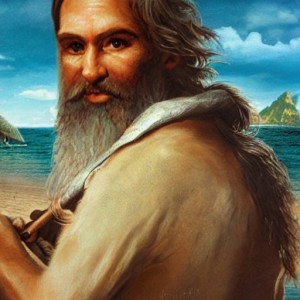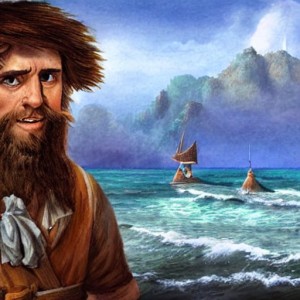One of the most famous English novels first saw the light in April 1719. Its full name is “Life, the extraordinary and amazing adventures of Robinson Crusoe, a sailor from York, who lived 28 years in complete solitude on an uninhabited island off the coast of America near the mouths of the Orinoco river, where he was thrown by shipwreck, during which the entire crew of the ship, except him, died, outlining his unexpected release by pirates; written by himself “over time was reduced to the name of the protagonist.
The work is based on a real story that happened to the Scottish sailor Alexander Selkirk, who served as boatswain on the ship “Senk Por” and landed in 1704, at his personal request, on the uninhabited island Mas-a-Tierra (Pacific Ocean, 640 km from the coast Chile). The real trouble of Robinson Crusoe was caused by his unsociable character, the literary one – disobedience to parents, choosing the wrong way of life (a sailor instead of an official in the royal court) and a heavenly retribution, expressed in a natural disaster for any traveler – shipwreck. Alexander Selkirk lived on his island for four years, Robinson Crusoe – twenty-eight years, two months and nineteen days.
The time of the novel is September 1, 1651 – December 19, 1686 + the period that the character needs to return home and the story of his unusual adventure. The motive for quitting parental prohibition (parallel with the biblical prodigal son) reveals itself twice in the novel: at the very beginning of the work, Robinson Crusoe was seized by repentance of what he had done, but it is a shame to appear to his friends (including neighbors) again on the wrong path, which ends with a long isolation on a desert island. The hero’s parental home leaves on September 1, 1651; Brazil, where he lives comfortably for the following years – September 1, 1659. A symbolic warning in the form of a recurring sea storm and the time of the beginning of the adventure turns out to be nothing significant for Robinson Crusoe.
The novel by Daniel Defoe lies at the origins of the novel itself. In its style (simple, precise language, devoid of specific artistic techniques), it refers more to the journalistic genre of “travels” that first appeared in English literature in the 16th century, than to the literary novel, but the presence of an adventure story, a clearly expressed artistic idea ( the preservation of humanity in a difficult struggle for life) and the development of characters (growing up Robinson Crusoe, ennobling Friday ogre, repentance of pirates) makes it a full-fledged literary work. Adventure component gives “Robinson Crusoe” features of adventure novel; knowledge of the main character of physical life indicates a novel of education; the passage of the character of a complex path of arrangement on a desert island brings the work together with an allegorical parable about the development of human civilization; the presence in the novel of exotic for the English environment elements (distant countries, sea travel, wild animals, cannibals and pirates) makes it a classic adventure novel. Initially, the “Robinson Crusoe” was created for an adult reader, but over time, naturally moved into the circle of children’s reading.
The main idea of the work is the spiritual and intellectual maturation of a young man, put in unique living conditions. His life on the desert island of Robinson Crusoe begins with a minimum of knowledge about the device necessary for the survival of things and the main set of the latter. Some of the items the hero has to make on their own. He does not mind spending time on it, because he understands that the latter, like his “work, was very cheap, so does it matter what and where they went?”.
Vital things (ship’s boards, food, clothing, carpenter tools, knives, weapons, gunpowder, etc.) in the novel are contrasted with money. Robinson Crusoe perceives the latter as “worthless garbage”: on an island devoid of people and merchant shops, they are useless. At the same time, the gold found on the ship still wraps the hero in a piece of canvas and takes it to the island. The act is not explained to them in any way, but the reader understands that he is dictated by the hope of returning to the fold of civilization.
In addition to factory art (making a pipe, baskets, fur clothes, etc.) Robinson Crusoe develops on the island the professions of a farmer and herdsman: he quickly realizes that he will not be able to stretch provisions on ships for a long time, therefore he starts collecting turtle eggs and grapes, tame wild goats, grow rice and barley.
The first years the hero hates his place of residence, curses the island and calls it the island of Despair. Having built a boat and almost died in the vast ocean expanses, Robinson Cruz begins to perceive his position quite differently: he looks at hills and valleys with warm tenderness, rejoices at his fields, groves, cave and goats, sees beauty in a simple road from the coast to the hut.
Daily work helps the hero to not despair, the preservation of habits – not to lose their social identity. First of all, Robinson Crusoe starts a calendar, because for him it is important to know what month and year is in the yard. While he has paper and ink, the hero keeps a diary. The parrot in the life of Robinson Crusoe appears as another voice to be heard so as not to go insane from loneliness.
Friday’s release becomes a new milestone for island life for Robinson Crusoe. The handsome young savage is drawn by Daniel Defoe in a somewhat idealized way – the author notes in him a courageous and pleasant face, honesty, hearty simplicity, sincerity, a feeling of deep gratitude for salvation from death. Friday is a true child of nature – it is easy to learn the basics of Western morality due to the fact that it was initially deprived of the bloodthirsty that is usually attributed to savages: for example, talking about the white people who appeared in his tribe, he explains to Robinson that they have become savages brothers and eaten they were not, because “our people eat only those who are victorious in battle”.

